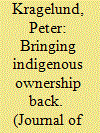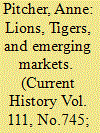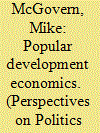| Srl | Item |
| 1 |
ID:
145180


|
|
|
|
|
| Summary/Abstract |
We know less about growth and poverty based on numbers in African economies than we would like to think. Numbers are soft, and data availability is sparse, sporadic, and uneven. For researchers and data users, whether engaged in inferential or descriptive statistics, the message is that studying Africa by numbers can be misleading. This research note surveys the knowledge gap and provides guidance on how to and how not to study Africa by numbers.
|
|
|
|
|
|
|
|
|
|
|
|
|
|
|
|
| 2 |
ID:
092174


|
|
|
|
|
| Publication |
2009.
|
| Summary/Abstract |
Smallholders now grow most of Malawi's main export crop - burley tobacco. Based on nineteen months' fieldwork in the Central Region, this article offers a sociological interpretation of why some smallholder growers spend a proportion of burley income on conspicuous consumption in rural towns and trading centres. This practice can be seen as a form of inculcated behaviour whereby smallholders reproduce elements of one model of success in this region: that of the Malawian tobacco bwana (boss/master). The article discusses implications from this form of potlatch behaviour by describing the contrasting fortunes of two non-farm rural enterprises, examining data on how tobacco production and 'cooling off' is viewed by wives, and comparing the crop preferences of husbands and wives. It concludes by suggesting that the concept of conspicuous consumption may provide an alternative prism to the instrumental lens of neo-patrimonialism through which to view apparently unintelligible investment decisions in African economies.
|
|
|
|
|
|
|
|
|
|
|
|
|
|
|
|
| 3 |
ID:
114932


|
|
|
|
|
| Publication |
2012.
|
| Summary/Abstract |
African economies are currently experiencing an upsurge in foreign ownership of key parts of their economies. This, however, is not new, and in the wake of independence several African countries pursued indigenisation policies to bring ownership back to their own citizens. Now indigenisation policies thrive again, this time disguised in terms such as 'empowerment', but just as politicised as in the 1970s. Zambia is at the heart of this development. In the light of liberalisation, booming commodity prices and the increasing importance of Chinese investors, this article seeks to further our understanding of how processes of exclusion interact with domestic politics in Zambia. It argues that the Citizens Economic Empowerment Commission, a new institution to bring ownership back to Zambians, builds on a long tradition of nationalist policies in Zambia, while its actual work is strictly related to the critique of the growing foreign dominance over the economy, and in particular of the upsurge in Chinese investments.
|
|
|
|
|
|
|
|
|
|
|
|
|
|
|
|
| 4 |
ID:
182515


|
|
|
|
|
| Summary/Abstract |
Africa has experienced over a decade of sustained economic growth. However, since the outbreak of Ebola, there have been pertinent questions as to whether and what extent such outbreaks have developmental implications in the continent. It is in this context that this article investigates whether and to what extent the ongoing COVID-19 pandemic affects the development of Africa’s economies. Using data from various international organizations, we show that the pandemic has indeed slowed down African economies, albeit in differing degrees across various regions of the continent. However, the slowdown is moderate compared with economies in high-income countries and the world economies as a whole. We contend that while it is difficult to predict when the crisis is going to end, the continent can navigate itself out of it by leveraging on the ever-increasing global prices of agricultural products and natural resources.
|
|
|
|
|
|
|
|
|
|
|
|
|
|
|
|
| 5 |
ID:
115618


|
|
|
|
|
| Publication |
2012.
|
| Summary/Abstract |
Much of Africa's wealth is unevenly spread across the continent and tends to be concentrated in resource-rich countries with large populations.
|
|
|
|
|
|
|
|
|
|
|
|
|
|
|
|
| 6 |
ID:
105254


|
|
|
|
|
| Publication |
2011.
|
| Summary/Abstract |
In 1997, I found myself newly arrived at Oxford University. I was taking a detour from my path to do research in West Africa thanks to a fellowship that funded a year of ancillary training before my fieldwork. Though studying anthropology, I was at St. Antony's College, where Paul Collier's Center for the Study of African Economies is located, and was in the same entering cohort as Collier's now-famous student Dambisa Moyo (assuming I would not be able to remember her first name, she offered, "it sounds kind of like 'pizza'").
|
|
|
|
|
|
|
|
|
|
|
|
|
|
|
|